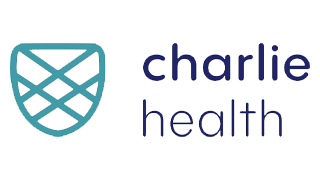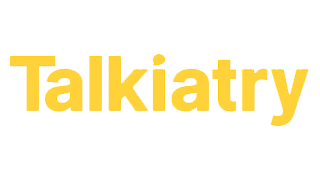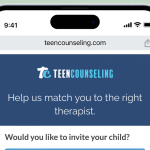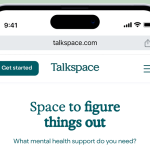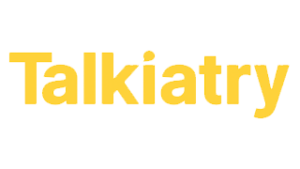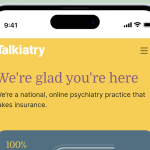Table of Contents
If your teen is experiencing mental health challenges, they’re not alone. In 2022, one in five teens reported symptoms of depression or anxiety, and LGBTQ+ and racial and ethnic minority youth are at even greater risk.
Even when you know your teen needs help, it can be hard to find consistent care. Find out if one of our three recommended teen therapy platforms (or one recommended online psychiatry platform) is right for your family.
Our pick for the best platform overall
Our best overall pick for online therapy for teens is TeenCounseling by BetterHelp. We like how easy it is to sign up and get started with a therapist, and we appreciate that the app makes it easy for parents to be part of their teen’s therapy process. The bonus features, like messaging with your provider and keeping a digital journal, are also helpful for teens.
Our picks of the best online therapy platforms for teens
- TeenCounseling: Best overall
- Charlie Health: Best outpatient intensive therapy for teens
- Talkspace: Best text therapy for teens
Our pick of the best online psychiatry platform for teens
- Talkiatry: Best psychiatry and medication management for teens
Our testing experience






The Handbook team researched more than 70 online therapy platforms and online psychiatry platforms, directories, and networks. Based on our research, we signed up for the top 20 platforms to test out for ourselves, including several platforms that serve teens. Here’s what we did with each online therapy platform:
- Fill out the intake assessment.
- Subscribe as a new user.
- Get matched with a therapist.
- Schedule and attend sessions on the platform for one month.
- Go through the steps to switch therapists.
- Contact customer support with questions.
- Explore platform features such as journals, worksheets, and group sessions.
- Cancel subscription.
We don’t ask teens to test online therapy platforms for ethical reasons. However, we ask parents of teens using these platforms to offer feedback on the platform’s ease of use, affordability, and therapist quality. Our testers explore the platforms and attend online therapy sessions for at least four weeks. Testers who are parents of teens using online therapy sometimes attend sessions with their child’s therapist, and we then ask parents to reflect on those experiences, including how easy it was to find a therapist both they and their teen trust. Testers log their experience in a diary and come together to share their findings.
To better understand the teen therapy experience, we talk to licensed mental health providers who specialize in adolescent and family therapy. We also ask teen online therapy users to complete anonymous surveys about online therapy in general and, in some cases, about specific online therapy platforms. Through this process, we discovered the following trends:
- Older teens and their parents sometimes prefer online therapy to in-person therapy because it is easier to fit in with their busy schedules.
- One therapist we spoke to shared that teens who did online school during the pandemic still experience screen fatigue and may prefer to have an initial in-person meeting with a therapist to forge a stronger connection. In this case, some users may choose to find an online therapist in their geographic location who also offers in-person sessions.
- Teens also emphasize the importance of setting shared expectations for therapy sessions early in the process, including how quickly they tackle troubling issues. Most teens don’t feel comfortable sharing personal information until they feel a personal connection to the therapist.
My therapists have always wanted to constantly discuss all the trauma and deep stuff before I knew them. I also felt kind of stupid when I was with my therapist because I was always saying, ‘I don’t know’ to the questions they were asking. I don’t know if this was just my therapist, but maybe more questions that are very subjective and the patient guiding where the conversation is going would make me feel more comfortable.
Teen Online Therapy User
Most Handbook Team testers feel the need to switch providers, especially when using platforms that initially choose providers for patients. Reasons for switching providers include a lack of initial connection, an identity-related issue (for example, preferring an LGBTQ+ provider), or scheduling conflicts.
From our tester
“We honestly would have preferred to start with an in-person therapist for our son, but scheduling just gets so complicated with his sports and school schedule. It took a couple of tries to find someone online who was available at times that worked for us, but once we did, logging on from home in the evening or on weekends made it possible to add therapy to the mix. Otherwise, not sure we could make it happen.”
Online therapists may not be the most appropriate resource to help in a mental health crisis. If you or someone you know is a danger to themselves or others around them, it’s an emergency that can’t wait for an online therapist’s response.
Don’t wait. You can find help immediately by:
- Calling 911
- Visiting an emergency room
- Visiting urgent care
- Calling or texting 988 for the Suicide & Crisis Lifeline
- Chatting online at 988lifeline.org
- Calling the Substance Abuse and Mental Health Services Administration (SAMHSA) Helpline at 1-800-662-4357 or texting your zip code to 435748
- Calling the National Sexual Assault Hotline at 1-800-656-4673 or chatting online
- Calling The Trevor Project at 1-888-488-7386 or texting START to 678-678 to talk with trained professionals who understand the challenges faced by LGBTQ youth
All the above options will connect you with trained professionals who can provide crisis support. You can find even more resources, including international options, on our helpline directory page.
Compare the best online therapy platforms for teens of 2024
| Services | Individual therapy | Individual therapy; group therapy; family therapy | Individual therapy; psychiatry; medication management | Individual therapy; psychiatry; medication management |
| Ways to connect | Live phone, video, or chat sessions; messaging | Video and audio sessions | Video and audio sessions; live chat; messaging | Video sessions; messaging |
| Type of therapy | Cognitive behavioral therapy (CBT), acceptance and commitment therapy (ACT), and more | Intensive outpatient therapy using CBT, DBT, and art and music therapy | CBT, DBT, humanistic therapy, somatic therapy, and more | Trauma-focused CBT, dialectical behavior therapy (DBT), and more, only when recommended by psychiatrist |
| Out-of-pocket monthly cost | $260–$360 | $8,000–$10,000 for 9–12 week program; most users pay with insurance | $276–$725; many users pay with insurance | Varies by insurance provider; average co-pay per session is $30 |
| Accepts insurance | No | Yes, including Medicaid | Yes | Yes |
The best online therapy platforms for teens
TeenCounseling: Best overall
Our final verdict
TeenCounseling is our best overall pick for online therapy for teens because its large selection of therapists makes it easy to start therapy quickly. If you don’t like your initial therapist, the platform makes switching easy. The platform also offers types of therapy, like cognitive behavioral therapy A type of talk therapy centered on making positive changes in both thinking and behavior. (CBT), that can help teens manage anxiety and depression. Testers also like that parents and teens can communicate separately with the therapist in the TeenCounseling messaging app.
Insights from our testers
One of the things we like best about TeenCounseling is the ease with which users can find and set up appointments with therapists who specialize in adolescent care. One of our testers met with a therapist within three days of creating an account. When the therapist’s schedule didn’t match their child’s, they requested a new therapist by selecting “Change therapist” from the “More” menu in the app. They then received a list of therapists matching their child’s needs and preferences.
The tester could select a new therapist after reviewing the following provided information:
- Therapist bio, including licensure and other credentials.
- Reviews of therapists from other TeenConseling users.
- Therapist years of experience and clinical approaches.
- Therapist availability (open appointments are visible on a calendar).
The tester selected a new therapist and scheduled an appointment for the following week. After scheduling, it’s easy to message the therapist using either the TeenCounseling mobile app or the platform’s desktop version.
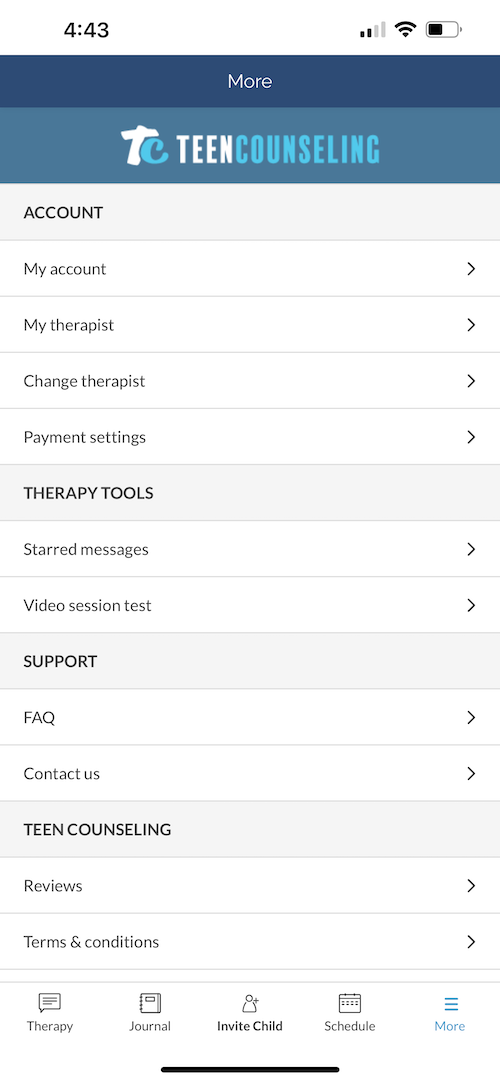
The TeenCounseling app is useful for scheduling appointments, attending sessions, and communicating with your therapist. The app and desktop versions of the platform also include a digital journal with daily prompts, like “Some ways my anxiety has helped me achieve something are…” and “If my angry parts were allowed to speak up unfiltered for one minute, they would say…” Teens can choose to share their journal entries with their therapist, but otherwise, their responses remain private. Your therapist may also send worksheets for your teen to complete before the session. Our tester appreciates that the therapist sends worksheets about her teen’s interests, fears, and goals for therapy.
In our testing experience, TeenCounseling therapists did a good job of staying connected to parents while respecting the teen’s privacy. Before each session, the therapist asked to connect with the parent for 10 or 15 minutes. This way, parents can learn ways to support their teen’s therapy journey. When appropriate, teens and parents may meet with the therapist together to work through communication issues or discuss goals for therapy.
From our tester:
“My teen, I think he’s embarrassed to go to an office for a therapy appointment. Even though we talk about the importance of mental health at home, that stigma about therapy is still there. Doing therapy from his own room makes the whole process more approachable.”
What other users are saying
In our February 2024 survey of 100 parents with children who used the TeenCounseling platform, 82 percent felt the therapist provided a safe space for their teen, and 77 percent saw a reduction in the symptoms that led their teen to therapy in the first place.
Charlie Health: Best outpatient intensive therapy for teens
Our final verdict
Charlie Health is our top pick for online intensive outpatient care for teens. This platform prioritizes teens who are transitioning from inpatient care or are attending weekly therapy sessions but are still struggling with their mental health. We like that the program provides a unique care plan for each teen, including peer support and as-needed referrals for psychiatry.
Insights from our testers
Intensive outpatient programs (IOPs) offer a higher level of care than weekly therapy sessions, but a lower level of care than inpatient treatment. In IOPs, patients typically see mental health providers multiple times per week and engage in both individual and group therapy. Patients in IOPs have detailed care plans that may include therapy, psychiatry, and medication management. Charlie Health is an online IOP specializing in teens and young adults. Common conditions treated by Charlie Health include anxiety disorders, depression, trauma, self-harm, and substance abuse disorders. Teens enrolled in Charlie Health usually follow this schedule:
- One individual therapy session each week.
- One or two hours of family therapy each week.
- Three days per week of peer-focused group therapy in three-hour sessions.
- Referrals to psychiatrists, as needed.
Charlie Health could be a good option if your teen was recently discharged from a residential treatment program, partial hospitalization program, or an emergency department. The program also serves high-risk teens who haven’t been hospitalized but aren’t getting the support they need through weekly therapy sessions. The Charlie Health representative we spoke to emphasizes that intensive therapy is simply accelerated therapy. In other words, it’s the same amount of therapy you might receive over several months, but condensed into nine to 12 weeks, which is typically the length of time insurance will cover this type of program.
Click their website’s “Get Started” button to apply for the program. You’ll be prompted to answer simple questions about your teen and provide insurance information. The care team will reach out within days of receiving your information, and if you want to talk to someone sooner, you can call their customer service line. The Charlie Health representative our tester spoke to was helpful and understanding. When one of our testers shared that Charlie Health might not be the best fit for their child, the representative asked if the care team could reach out anyway to provide resources—like other outpatient programs or support groups— that could benefit their child.
What other users are saying
Peer support groups are a major component of the Charlie Health program. Nine hours per week are spent in facilitated groups. In our April 2024 anonymous survey of teen online therapy users, several respondents pointed to peer support as a way to seek relief from mental health issues. Research also supports this approach, suggesting that peer support among young adults can lead to greater self-esteem and reduced symptoms of depression.
Talkspace: Best online text therapy for teens
Our final verdict
Talkspace is our top pick for texting therapy for teens. We like that the platform makes it easy for teens to reflect on their progress regularly and check in with their therapist. All subscription plans include unlimited messaging with your provider, and the app includes regular assessments to help track symptoms. We also like that Talkspace accepts payment from many large insurance carriers and provides free online therapy for all New York City teens.
Insights from our testers
Most of today’s teens are comfortable navigating a smartphone and communicating via text messages. Text therapy options for young people are growing, and studies show these interventions can help reduce symptoms of depression and anxiety. Still, some experts worry text therapy may not be enough to help struggling teens.
“Texting is not a suitable form of therapy for the same reason that texting is not suitable for resolving conflict or diving into difficult topics,” Danda says. “Effective therapy requires true communication and connection that is only obtained through tone, facial expressions, and real-time back-and-forth conversation present in face-to-face interactions, whether in person or online. Texts are more easily misinterpreted.”
For this reason, it may be best for teens to use texting therapy as an addition to live therapy sessions rather than a replacement.
We love the symptom tracker in the Talkspace app, which is a great tool for encouraging self-reflection in teens. The easy onboarding process is another reason to choose the platform. One of our testers had their first session with a provider just four days after creating an account, including switching therapists.
Compared to other online therapy platforms for teens, Talkspace may provide fewer opportunities for parental involvement, especially if your teen signs up for a text-only plan. The platform is currently not set up to support family therapy. If you choose the texting plan, you may be unable to discuss important issues with your child’s therapist face-to-face. Also, Talkspace video sessions are only 30 minutes long, instead of the 45-minute or longer sessions offered by other platforms.
What other users are saying
In our October 2023 survey of 600 online therapy users, more than half of Talkspace users connected with a mental health provider for their first appointment within one week of signing up for the platform. In our February 2024 survey of 100 Talkspace users, 90 percent somewhat or completely agree that they had positive interactions with their therapist.
Handbook Tip #1
We asked child psychologist Dr. Caroline Danda how parents should approach a teen who isn’t initially interested in therapy. Here are her tips:
- Make observations to validate the challenge the teen may be experiencing. For example, “I’ve noticed you are having a lot of anxiety around friendships lately. I think getting an outside perspective and support might be helpful.” Acknowledge that you may not fully understand and are unsure of the best way to help, but you want to ensure they feel supported.
- Offer choices when possible. Narrow the options and ask the teen to select the best fit for them. Giving them a sense of control can increase their buy-in.
- Contract with the teen to attend a few sessions. Suggest the teen attend a few initial sessions with an open mind, and then they can decide whether it’s a good fit or they’d like to explore other options.
- Meet with the therapist first. Meeting the therapist beforehand lets you get your questions answered and conveys that you’re all working together. Even if your teen is initially unwilling to engage in therapy, you can still find effective guidance from the therapist on how to best support your child.
The best online psychiatry platform for teens
Talkiatry: Best online psychiatry and medication management for teens
Our final verdict
Talkiatry is our pick for best online teen psychiatry and medication management because it helps address the current shortage of psychiatrists, especially in rural areas. This platform can work for teens who are already seeing a therapist but could potentially benefit from medication for conditions like depression, ADHD, and OCD. Talkiatry psychiatrists see children as young as five years old and can prescribe medications and provide ongoing medication management. While Talkiatry does also offer talk therapy, you can only receive this if you are already working with a Talkiatry psychiatrist and they recommend it as part of your treatment.
Insights from our testers
The average wait time for behavioral health service in the United States is 48 days. With the number of psychiatrists at less than half the number of mental health counselors, the wait for psychiatry can be even longer. For many young people, two months or longer is too long to wait for psychiatric care. With Talkiatry, most people can see a psychiatrist within one week of creating an account.
We like that Talkiatry accepts insurance, including BlueCross BlueShield, Cigna, Aetna, and United Healthcare. If Talkiatry does not take your insurance, there is no out-of-pocket option, which is one drawback of the platform. One of our testers gave the platform high marks for ease of scheduling appointments and quality of providers. Testers schedule follow-up appointments with their psychiatrist during sessions and send a message in the Talkiatry app if they need to reschedule or follow up with the provider in between sessions. The providers they’ve worked with respond within hours.
If you’re thinking of using Talkiatry’s medication management services for your teen, keep in mind that mental health medications are usually more effective when used in conjunction with therapy. One tester notes that their Talkiatry psychiatrists “are more focused on what to prescribe and expect you to have additional mental health services, like a therapist, to combine with the medications.” Most of their discussions with psychiatrists centered around the medications the tester takes and how they work for them.
Many Talkiatry psychiatrists will prescribe controlled substances, including medications used to treat ADHD. However, whether or not a psychiatrist prescribes such medications is based on a thorough evaluation of the patient’s needs and on the state laws where you live.
Therapy is a first-line treatment to develop coping skills and make positive changes that address anxiety, depression, and behavioral difficulties. However, sometimes the symptoms are severe enough to significantly impair functioning or interfere with the ability of the teen to benefit from therapy fully. In these cases, therapy alone may not provide sufficient benefit, and consulting with a medical provider regarding medication options is warranted. Medication should be viewed as a tool that can be used to help manage symptoms in combination with therapy.
Caroline Danda, PhD
As you make decisions about the best online treatment options for your teen, it’s worth noting that primary care providers can also prescribe medications. “Many pediatricians and family medicine providers are well-versed in treating disorders such as anxiety, depression, and ADHD,” Danda shares. “It’s even better if they can collaborate with the therapist. They also have the advantage of knowing the teen for a longer period, which can provide the teen a sense of comfort and trust.”
What other users are saying
In our February 2024 survey of 100 Talkiatry users, 80 percent of users are either satisfied or very satisfied with the reduction of symptoms that led them to seek treatment in the first place. Survey results also speak to Talkiatry’s ease of use, with 86 percent of users completely or somewhat agreeing that Talkiatry’s sign-up process was quick and easy.
Questions to ask before starting online therapy for a teen
Before starting a teen online therapy platform, consider the following questions:
- What types of sessions are available? Will my teen meet with a therapist face-to-face or only through messaging?
- What parts of the platform are accessible to parents? Can you occasionally meet with your teen’s therapist to check their progress?
- Does the platform offer bonus features? Symptom trackers, digital journals, and group therapy sessions are helpful tools for teens.
- How often will my child interact with their therapist? Greater frequency of sessions has been linked to better therapy outcomes.
- How is my child’s privacy protected on this platform? Read the platform’s privacy policy and review it with your teen.
What to look for in an online therapist for teens
Your child’s therapist should be licensed and have previous experience working with adolescents. They should also be aware of the unique challenges facing teens, including social relationships, anxiety about academics, and self-esteem issues. Today’s teens have the added pressure of navigating social media and the constant stream of world events available on their smartphones. It’s also important for teen therapists to be comfortable working with families, teachers, and doctors, as a teen’s well-being often depends on their environment and key people in that environment.
When you meet your therapist, ask about their approach to working with teens. Are they sensitive to issues your teen is facing? Are they willing to take the time to get to know your child? Ultimately, the right therapist is one your teen feels comfortable enough with to share their feelings and challenges.
“The key to working with teens and tweens, regardless of whether therapy is self- or parent-initiated, is respecting their autonomy. Building rapport and letting them feel seen and heard is crucial to gaining their buy-in to the therapy process,” Danda says.
Who should and should not use online therapy for teens
People having an acute mental health crisis or thoughts of suicide need to get help now by visiting an emergency room or dialing 988 to speak with someone on the Suicide and Crisis Lifeline. Also, teens experiencing complex or co-occurring mental health issues may need more help than some online therapy platforms can provide. Some platforms, like Charlie Health, offer intensive outpatient care, but most platforms only offer one or two sessions per week.
For teens who need additional support for symptoms of depression, anxiety, ADHD, or other common mental health conditions, online therapy provides a convenient way to get help from the comfort of their own homes. Online therapy can also help teens build self-esteem and self-awareness. As one teen wrote in our anonymous April 2024 survey, “I think the most helpful thing for me was I got to explore my identity a lot more and got to discover who I was.”
Frequently asked questions
Parental consent for therapy varies by state. In most cases, minors need written consent from parents or guardians to work with an online mental health provider. Some states, like Maryland and Connecticut, allow teens to participate in therapy without parents’ permission.
Yes. Teen therapists often talk with parents about concerns, challenges, and goals for therapy. In some cases, therapists may meet with the child and the parent simultaneously.
Studies show online therapy for youth to be just as effective as in-person therapy and is often a preferred format for teens.





